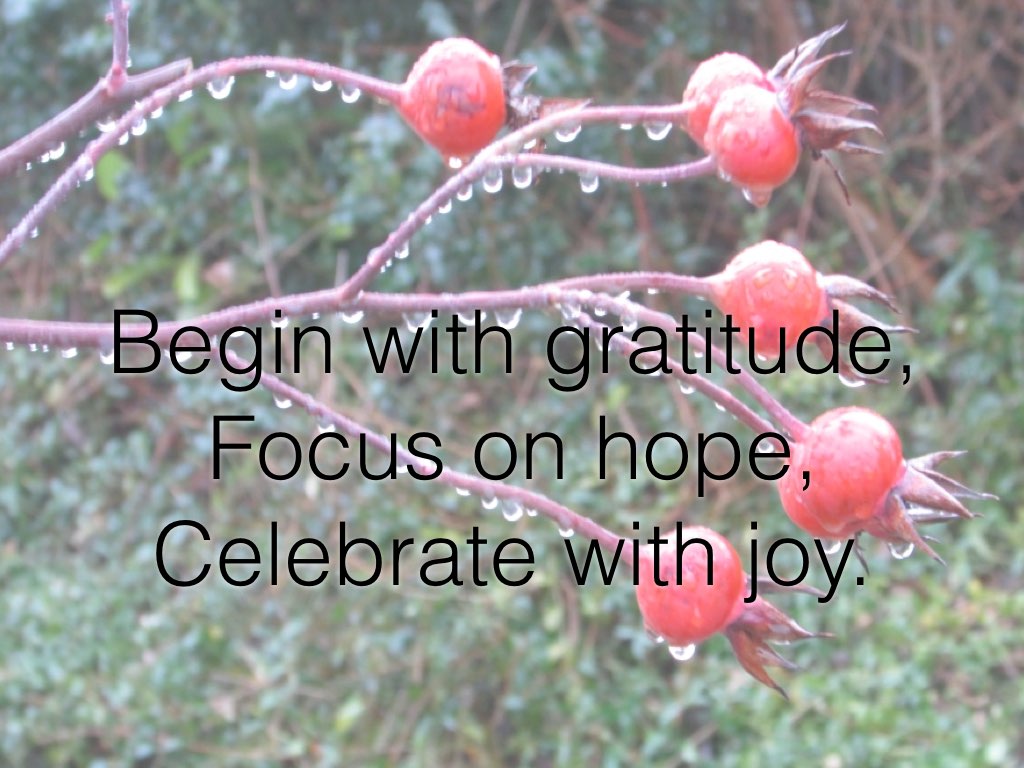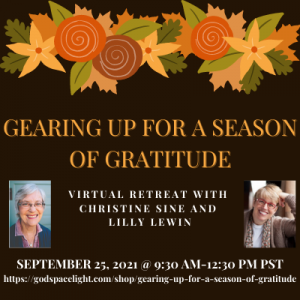by Christine Sine,
I am so enjoying getting ready for our upcoming retreat Gearing Up For a Season of Gratitude. What a wonderful preparation for my upcoming season of gratitude. As many of you know, ever since the year I celebrated Thanksgiving in Canada at the beginning of October, and American Thanksgiving at the end of November, I designate October and November as my gratitude months and I feel it should become a permanent season on the liturgical calendar. This year, I feel I need the season more than ever. The ongoing challenge of COVID, the impact of Hurricane Ida, the horrors of Afghanistan, and the struggles with racism and economic inequality weigh heavily on all of us. The practice of gratitude, interwoven with wonder, is one of the tools we all need to cope with the exhaustion and looming burnout that besets us.
Diana Butler Bass’s book, Grateful: The Subversive Practice of Giving Thanks continues to inspire me. As I mentioned in last week’s Meditation Monday, she helped me realize that one reason it is difficult for us to establish gratitude practices that stick is that we do not fully understand what gratitude is. She explains that gratitude involves both emotion and ethics (moral principles). We feel grateful when we see something beautiful or receive unexpected gifts from someone – that is definitely emotion. Writing a thank you note to show we appreciate the gift is a choice, an ethical decision that comes from our belief that thank you notes matter.
Most of us, she points out, have a distorted view of gratitude emphasizing only one aspect, usually relegating it to feel good emotions that come and go in our lives. It is this confusion that makes it so difficult for us to choose to practice gratitude as a way of life. When we get depressed or anxious or stressed, we are less likely to feel gratitude as an emotion.
Gratitude is not only the emotional response to random experiences, but even in the darkest times of life, gratitude waits to be seen, recognized and acted upon more thoughtfully and with a sense of purpose. Gratitude is a feeling, but it is also more than that. And it is much more than a spiritual technique to achieve peace of mind or prosperity. Gratitude is a habit of awareness that reshapes our self-understanding and the moral choices we make the world.” (Grateful, 60)
Don’t you love that? Gratitude is a habit of awareness that reshapes our understanding of ourselves and the world around us. In other words, we can choose to be grateful people and establish practices that develop it into a lifelong habit. In the process, we become happier, healthier, and less stressed people. Gratitude as a way of life is, I think, an essential tool to help us overcome burnout.
Many of us, myself included, tried keeping gratitude journals that lasted a week and then got discarded. To be honest, making a list of things I am grateful for just did not seem to resonate with me, but I knew I needed something as well as my awe and wonder walks to help anchor me through this challenging season. Years ago, I read that there are three simple steps to make a routine into a lifelong practice: “Keep it simple, make it meaningful, stick to it”. Still good advice that certainly stood me in good stead as I developed my new practice.
Hopefully, my gratitude practice will help you too:
Gratitude Practice:
When I wake up in the morning I make a cup of tea and sit quietly in my sacred space for a few minutes enjoying the early morning sounds and sights. I close my eyes, take a few deep breaths in and out, and recite what became my morning mantra:
Thank you God for the gift of life
A wondrous gift so freely given.
I continue to sit quietly with eyes closed, breathing slowly in and out, receiving that gift, and allowing the wonder of it to sink down deep into my soul. Sometimes a list of gratitudes flows out – thankfulness for breath, sight, a warm house, thankfulness for a loving husband, a silly dog, and food on the table each day. Some days the list seems endless. On others, nothing comes to mind and I sit content in the presence of God knowing that if nothing else, the gift of life provides me with the opportunity to appreciate the glory of God and the wonder of the world in which I live.
When I sense my time of quiet contemplation is over, I open my eyes ready for the day. Then, if I feel prompted, I jot down what I felt thankful for that morning and end with the words:
Thank you God for you.
A simple mantra like this does a lot to shift our thoughts from negative to positive. When we begin the day with gratitude, not only does our stress lift, but we are able to see the silver lining in clouds throughout the day. So I hope you will try this practice or something similar to begin your day and ward off the burnout that is hanging over us. Notice in this prayer that I wrote as a response a couple of days ago that my gratitude that welled up was not for what I have but rather for God and God’s wonderful image within me.
Thank you God for the gift of life,
A wondrous gift so freely given,
A gift of breath, and sight and movement.
Of light, and awe and beauty.
Thank you God for the gift of love,
For the joy of waking each morning
To the delight of new opportunity.
Thank you for the gift to see the world
More fully and deeply as you do
To become more aware of what is
And be grateful for what is now
To notice the unnoticed, unappreciated, disregarded.
To encourage what pushes forward not what holds me back,
To respond to the inner voice of the Spirit
Unveiling the goodness of God in my life and in our world.


